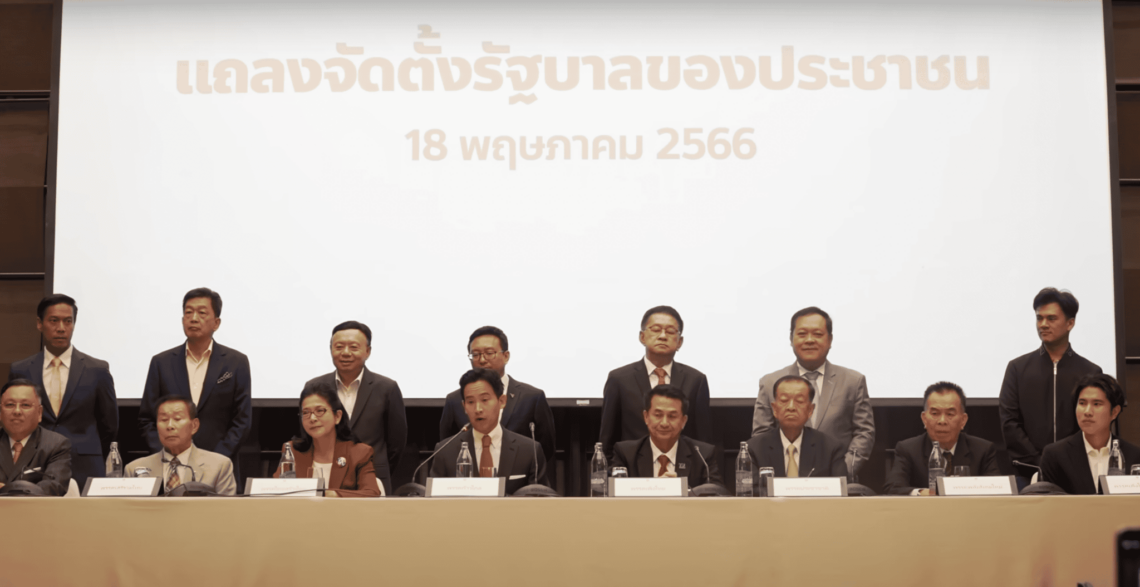Eight political parties that won a majority of seats in Thailand’s May 14 parliamentary election signed a letter of intent on Monday pledging to rewrite the constitution, recognize same-sex marriage and abolish conscription except in emergencies.
The three goals were among 23 outlined in an agreement drawn up after negotiations led by the Move Forward Party (MFP), which won the most seats and the largest share of the vote in the election, writes The Straits Times.
At a press conference on Monday, MFP leader Pita Limjaroenrat, who the coalition plans to support for the post of prime minister, described the talks between the parties as “fruitful” and “comprehensive”, but stressed that they were only “a first step”.
The law on insulting majesty, which the MFP had promised to change during the election campaign, was not mentioned in the document.
The law punishes any case of insult or defamation against the king, queen, regent or heir to the throne with a prison sentence of up to 15 years. Royalists argue that changing the law would affect the monarchy’s reputation, but critics claim the law has been misused for political reasons.
However, the MOU’s foreword mentioned that the government’s actions must not affect the “inviolable status of the monarch”.
Pita said his own party would continue to push for a change to the law.
The other seven parties in the coalition are Pheu Thai, Prachachat, Thai Sang Thai, Seri Ruam Thai, Fair, Pue Thai Rumphlang and Plung Sungkom Mai.
Although the coalition has 313 seats in Thailand’s 500-seat House of Representatives, it cannot guarantee that Pita, the coalition’s prime ministerial candidate, will eventually achieve this position. This is because 250 senators appointed by Thailand’s former ruling junta will vote with the lower house on the election of the prime minister, requiring any bloc to collect 376 seats to secure the prime ministership.
Asked by reporters what would happen if the coalition could not achieve the 376 votes required, Pita said that was not something he was worried about now.
He said the coalition was publishing the MOU for accountability, although he added it was too early to talk about the distribution of cabinet positions.
Other goals outlined by the coalition government include reform of the military, police and civil service, as well as the introduction of regulations on cannabis to rein in the current free-for-all environment.
On Sunday, Pita tweeted a message in English and Burmese urging Thailand’s transitional government and the international community to speed up aid to those in Myanmar affected by Cyclone Mocha.
This is in line with my new foreign policy agenda as prime minister-elect, he wrote.
My policy for Myanmar will involve all stakeholders, focusing on the consideration of human security, including humanitarian and economic aspects. These will be carried out with the aim of achieving mutual peace and prosperity for Thailand, Myanmar, Asean and other countries.
Asked to elaborate on his foreign policy on Monday, Pita said his government would drop quiet diplomacy so Thailand can assume greater leadership in the international sphere.
The electoral commission will need up to 60 days after the election to approve the results, before parliament can be convened to elect a prime minister. But some senators have already expressed their opposition to having Pita as prime minister, citing the MFP’s stance on insulting majesty. In addition, senators have formed a panel to further scrutinise Pita’s status.
Meanwhile, the Election Commission is considering a petition by the Palang Pracharath Party – the coalition leader of the current transitional government – questioning Pita’s eligibility as a candidate because he allegedly owns shares in a media company, in violation of election rules.
Thailand’s private sector has called for a new government to be formed as soon as possible to boost investor confidence and keep the 2023 budget disbursement on track.

